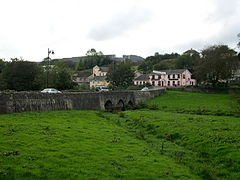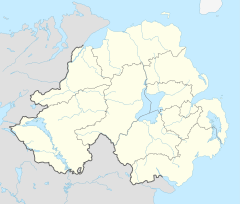Forkhill
Forkhill/Forkill
|
|
|---|---|
 |
|
| Forkhill/Forkill shown within Northern Ireland | |
| Population | 498 (2011) |
| Irish grid reference | J013158 |
| • Belfast | 41 mi (66 km) |
| District | |
| County | |
| Country | Northern Ireland |
| Sovereign state | United Kingdom |
| Post town | NEWRY |
| Postcode district | BT35 |
| Dialling code | 028, +44 28 |
| EU Parliament | Northern Ireland |
| UK Parliament | |
| NI Assembly | |
Forkhill or Forkill (from Irish: Foirceal) is a small village and civil parish in south County Armagh, Northern Ireland, in the ancient barony of Upper Orior. It is within the Ring of Gullion and in the 2011 Census it had a recorded population of 498.
The name is pronounced either /ˈfɔːrk.hɪl/ fork-HIL or /ˈfɔːrkɪl/ for-KIL and comes from the Irish foirceal, meaning "trough" or "hollow". This may refer to the village's position on flat land between the large hills of Tievecrom (to the east) and Croslieve (to the west).
The land in the parish was awarded by Elizabeth I to Capt. Thomas Chatterton and by James II to Lord Audley on condition of English settlement, but by 1659 it was still almost entirely occupied by native Irish people. Following the terms of a trust set up by a subsequent owner, Richard Jackson, much of the property was declared waste and resettled in 1787-91 with a view to encouraging the linen industry, most of the new settlers being Protestants. This was followed by serious breaches of the peace, which have been attributed not to sectarianism but by L. M. Cullen to political disputes among the gentry, and by David Millar to weakening social disciplines on the increasingly independent class of skilled linen weavers, both Protestant and Catholic.
...
Wikipedia

